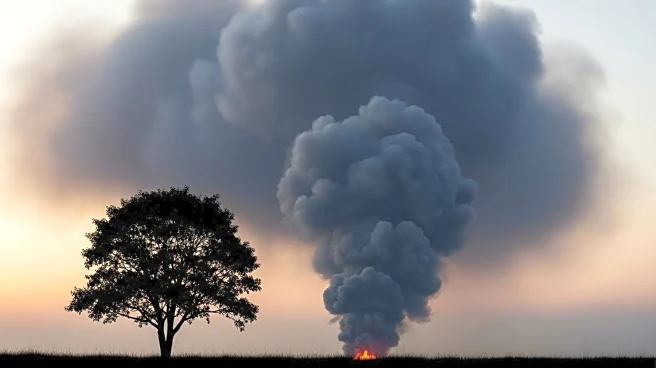What's Happening?
A study by scientists at Tsinghua University and researchers at Stanford and Stony Brook University has found that increased wildfire smoke could lead to 1.4 million premature deaths globally each year by the end of the century. In the U.S., wildfire pollution could result in over 71,000 premature deaths by 2050 under a high emissions scenario. The study highlights the health risks associated with PM2.5 particles in wildfire smoke, which can exacerbate respiratory conditions and lead to long-term health issues. The economic impact is also significant, with potential costs reaching $608 billion annually by 2050.
Why It's Important?
The findings underscore the severe health and economic consequences of climate change and increased wildfire activity. The projected rise in premature deaths due to wildfire smoke highlights the urgent need for policies to reduce emissions and manage forest fuels. The economic toll could affect various sectors, including healthcare and municipal credit markets, as borrowing costs rise due to increased health risks. Addressing these challenges requires coordinated efforts to mitigate climate change and adapt to its impacts, emphasizing the importance of international cooperation.
What's Next?
Countries may focus on reducing greenhouse gas emissions and implementing strategies to manage forest fuels through controlled burns. Public education campaigns could help individuals protect themselves from wildfire smoke exposure. International collaboration will be crucial to address the transboundary nature of wildfire pollution and develop effective regional strategies. Policymakers may prioritize investments in air filtration technologies and healthcare infrastructure to mitigate the health impacts of wildfire smoke.
Beyond the Headlines
The study highlights the broader implications of climate change on public health and economic stability. The findings emphasize the need for comprehensive climate policies that address both mitigation and adaptation. The impact of wildfire smoke on vulnerable populations raises questions about health equity and access to resources, as those with pre-existing conditions may face greater risks. The situation underscores the importance of integrating health considerations into climate policy and fostering resilience in affected communities.









